Brazil 2027 FIFA Women's World Cup bid
| Brazil bid | |
|---|---|
| for the 2027 FIFA Women's World Cup | |
| Bid details | |
| Bidding nation | Brazil |
| Bidding federation | Brazilian Football Confederation |
| Proposed venues | 10 (in 10 cities) |
The Brazil bid for the 2027 FIFA Women's World Cup is a successful bid to host the 2027 FIFA Women's World Cup by Brazilian Football Confederation (CBF). The single bid will be announced on 17 May 2024.[1] The bid entailed 10 venues in 10 host cities. The bid book was submitted on 9 December 2023.[2] The slogan of the bid is titled: "A Natural Choice".
Background
[edit]The Brazilian Football Confederation (CBF), along with the city hall of Rio de Janeiro, have expressed interest in participating in the election for the 2027 World Cup.[1] The country was already one of the finalists for the 2023 edition, but had to withdraw its candidacy due to the lack of support from the federal government, in addition to the financial crisis caused by the COVID-19 pandemic.[3] The project is part of a study carried out by the Rio Convention & Visitors Bureau (RCV), which also makes possible other events with Olympic sports and FIFA tournaments in Rio de Janeiro until 2032, including the 2031 Pan American Games, using the city again as host (since it hosted the competition in 2007), reusing the structures used in the 2016 Summer Olympics and Paralympics.[4][5]
It also highlighted the experience of hosting major events, such as the 1950 and 2014 FIFA World Cup, 2007 Pan American Games and 2007 Parapan American Games, 2016 Summer Olympics and 2016 Summer Paralympic Games, as well events like the 2000 FIFA Club World Championship, the 2013 FIFA Confederations Cup, the 2019 Copa América and the 2021 Copa América as a replacement of Argentina and Colombia due to COVID-19 pandemic in South America.
Proposed venues
[edit]On 1 March 2023, the city of São Paulo expressed interest in participating in the election with Rio de Janeiro, offering the Arena Corinthians and Allianz Parque to receive the matches.[6] The next day, CBF President Ednaldo Rodrigues sent a letter to FIFA, confirming the country's intention to compete in the 2027 World Cup. Other Brazilian cities can also participate in the project, as the event involves the entire country.[7] On 7 March the Brazilian Minister of Sports, Ana Moser, confirmed the country's bid to host the tournament.[8] Then, the cities of Salvador, Brasília, Cuiabá, Belém, Manaus and Fortaleza also offered to host the World Cup in an event on SAFs and the football capital market, organized by the Getúlio Vargas Foundation (FGV) on 11 March. Among the capitals that offered, only Belém did not host the last men's World Cup in the country in 2014, losing its place to Manaus.[9]
On 28 September 2023, the CBF confirmed the cities of Belo Horizonte, Brasília, Cuiabá, Fortaleza, Porto Alegre, Recife, Rio de Janeiro, São Paulo and Salvador as the capitals that will make up the official Brazilian candidacy document, with Belém leaving the project and the inclusion of the capital of Minas Gerais and Rio Grande do Sul, increasing the number of candidates for the World Cup to ten. The locations are similar to those of the 2014 men's edition, but without the inclusion of Curitiba and Natal in future matches.[10]
| Rio de Janeiro | Brasília | Belo Horizonte | Fortaleza |
|---|---|---|---|
| Estádio do Maracanã | Estádio Nacional Mané Garrincha | Estádio Mineirão | Arena Castelão |
| Capacity: 73,139 | Capacity: 69,910 | Capacity: 66,658 | Capacity: 57,876 |

|

|
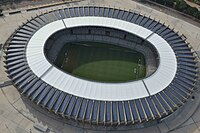
|

|
| Porto Alegre | |||
| Estádio Beira-Rio | |||
| Capacity: 49,055 | |||

| |||
| Salvador | |||
| Arena Fonte Nova | |||
| Capacity: 47,915 | |||
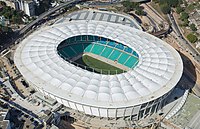
| |||
| São Paulo | Recife | Manaus | Cuiabá |
| Arena Corinthians | Arena Pernambuco | Arena da Amazônia | Arena Pantanal |
| Capacity: 47,252 | Capacity: 45,440 | Capacity: 42,924 | Capacity: 42,788 |
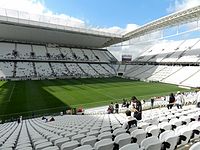
|
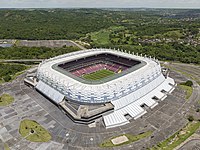
|

|
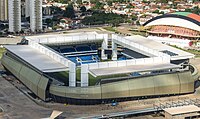
|
Marketing
[edit]The logo of the bid was unveiled in 5 December 2023. The logo, symbolizing equality, nature, and sustainability, features organic shapes resembling water flow forming a “B” for Brazil, with curves suggesting a footballer performing a “keepie-uppie” move. Blue symbolizes purity and green denotes nature and sustainability, reflecting the tournament’s environmental commitment. Modern typography complements the organic symbol, resulting in a memorable visual identity. The design underscores the essence of Brazilian women’s football, emphasizing its role in gender equality and the broader societal importance of sports. The brand identity celebrates both Brazil and women, encapsulating their significance in the project’s mission. This concerted effort in crafting a visually appealing and meaningful brand identity is integral to the success and impact of the project, ensuring it resonates with its target audience and effectively communicates its message of empowerment and equality in women’s football. Through meticulous attention to detail and thoughtful design choices, the brand identity encapsulates the spirit and values of Brazilian women’s football, reinforcing its position as a symbol of strength, resilience, and progress in the face of adversity. By leveraging the power of branding and visual communication, the project aims to elevate the visibility and recognition of women’s football in Brazil and beyond, fostering a culture of inclusivity, diversity, and empowerment within the sport and society at large, the slogan "A Natural Choice" was unveiled on 25 August 2023. The logo was designed by British agency Luiza Iglesias Design Studio.[11]
See also
[edit]References
[edit]- ^ a b "Rio de Janeiro pretende receber a Copa do Mundo Feminina de futebol, em 2027". band.com.br (in Brazilian Portuguese). Retrieved 13 February 2023.
- ^ "The Brazilian Bid Book for the FIFA Women's World Cup 2027" (PDF). FIFA.com. 9 December 2023.
- ^ "Brasil retira candidatura à sede da Copa do Mundo Feminina FIFA 2023". Brazilian Football Confederation (in Brazilian Portuguese). Retrieved 13 February 2023.
- ^ "Em parceria com a prefeitura do Rio, CBF quer sediar Copa do Mundo feminina em 2027". ge (in Brazilian Portuguese). Retrieved 13 February 2023.
- ^ "Rio de Janeiro tem Pan de 2031 nos planos esportivos da cidade". Surto Olímpico (in Brazilian Portuguese). Retrieved 13 February 2023.
- ^ "Prefeitura de São Paulo entra em "força-tarefa" por Copa feminina de 2027 no Brasil". ge (in Brazilian Portuguese). Retrieved 4 March 2023.
- ^ "Presidente da CBF envia ofício à Fifa manifestando intenção de sediar Copa do Mundo feminina de 2027". ge (in Brazilian Portuguese). Retrieved 4 March 2023.
- ^ "Ana Moser confirma Brasil como candidato a país-sede da Copa do Mundo feminina de 2027". ge (in Brazilian Portuguese). Retrieved 7 March 2023.
- ^ "Copa 2027: candidatura do Brasil terá ao menos oito estádios; sete cidades e DF já têm interesse". ge (in Brazilian Portuguese). Retrieved 13 March 2023.
- ^ Leal, Marcel Rizzo, Daniel. "Veja as 10 cidades candidatas para a Copa Feminina de Futebol, no Brasil". CNN Brasil. Retrieved 30 September 2023.
{{cite web}}: CS1 maint: multiple names: authors list (link) - ^ "Luiza Iglesias Design Studio BID for the Brazilian FIFA Women's World Cup 2027". World Brand Design. 7 April 2024. Retrieved 1 May 2024.

